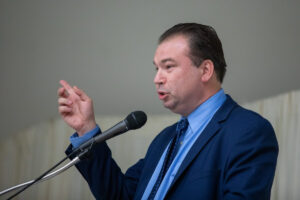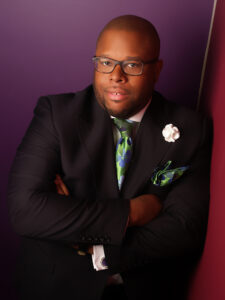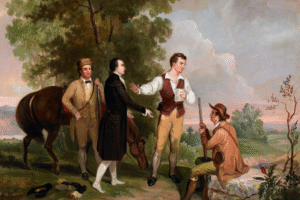Following a series of headline-making police–involved shootings in the spring, Governor Cuomo issued Executive Order 203, also known as the New York State Police Reform and Reinvention Collaborative.
The order mandates that each local government must convene a group of community members to formulate a plan for reform and to adopt that plan by April 1 in order to be eligible for further police funding.
Cities throughout Westchester County have responded to the mandate. The Village of Ossining and the City of Peekskill have appointed diverse task forces to begin the process which include police officers, community members, elected officials, clergy, educators, and local activists.
Peekskill’s task force is co-chaired by Mayor Andre Rainey and Antonio Knott, who is also heavily involved in the city’s LGBT community.
WIDER SCOPE
“The diversity allows people to be open, to be themselves,” says Knott. “We rely on these different perspectives to strengthen our proposals. These differences give us a wider scope.”

Also serving on the task force is Jeffrey Deskovic, who in 1990 was wrongly convicted for the murder of a Peekskill resident. He was exonerated in 2006 and now works as an advocate for police reform and the falsely imprisoned.
“We’re going to improve the quality of policing in Peekskill, and we hope that new policies and procedures will come out of this,” says Deskovic. “And, in the course of that, improve community ties with law enforcement.”
Ossining’s Working Committee includes village trustee Omar Lopez, Public Library board member Althema Goodson, Officer Juan Encarnacion, and Star of Bethlehem Church’s Rev. Shaun Jones.
TEAM EFFORT

“The final composition of this Working Committee represents the true diversity that our Village prides itself on,” says Jones. “As we move forward in this process I look forward to working with Village officials, fellow committee members and most importantly the community at large to get their input and experiences to ensure that our communities are not over policed and under resourced.”
The Town of Cortlandt and the Village of Croton-on-Hudson are currently in the process of assembling police reform task forces of their own.
In a statement, Cortlandt Councilman James Creighton, who is chairing the town’s task force, said, “While the Town of Cortlandt no longer has its own police department, which was disbanded in the 1990s (saving taxpayers millions of dollars), the town seeks to ensure that the County and New York State (who provide Cortlandt’s policing functions) will take the local community’s feedback into account when they develop their required plans.”
COMMUNITY MEETINGS
Croton’s Police Reform & Reimagining Advisory Task Force is in formation. During October and November, community meetings moderated by Village Manager Janine King have been held, with Police Chief John Nikitopoulos and his officers responding to citizens who show up in person, submit questions in advance, or call in to during the forum as it is live streamed on the village website.
Croton-on-Hudson also has conducted a community survey on public safety and law enforcement to solicit input on current perception and where improvements can be made.
Emphasized by both the Governor and members of these committees is the importance of transparency and community involvement. A Tarrytown Board of Trustees meeting on police reform drew 27 participants from the community. “It was pretty remarkable,” said former Mayor Drew Fixell. “It’s probably the largest meeting I’ve seen in almost 15 years.”

Antonio Knott notes that there are many opportunities for local residents to share their input including attending public meetings, communicating via email, or even joining one of the task force’s committees.
“It is a public task force,” says Knott. “We are open to all forms of input.”
NEW RELATIONSHIP
As the Governor’s executive order was prompted by the death of George Floyd and the Black Lives Matter movement, these reform groups have a special emphasis on changing the relationship between local police and communities of color.
“We cannot say that we are okay, because we are not. There are people in this community that are terrified of the police,” said former Tarrytown resident Ana Lopez. “Police get to take off their blue uniforms when they get home, we don’t get rid of our color.”
More important than affecting police procedures, says Knott, is strengthening relations between these communities and local law enforcement.
“We’re not setting out to change the way you conduct investigative work,” he says. “We want the police to see everyone as equals. We want to improve their relationship with the community.”
NOT FOR SHOW
Deskovic is aware of the skepticism some have towards police reform initiatives, and insists that theirs will be legitimate and effective.
“If I thought for a minute that this was political theater, or if it were just for show, I would walk,” he says. “Because my word and my reputation as an advocate mean everything to me.”
Although these task forces are still in their early stages, members are confident that their actions will lead to meaningful change in local policing.
“The public is aware of the need for criminal justice reform,” says Deskovic. “There is a general clamor for it.”
“I’m very optimistic,” says Knott. “I have to be.”
- governor.ny.gov/news/no-203-new-york-state-police-reform-and-reinvention-collaborative
Christian Larson lives in Peekskill, having recently moved from Brooklyn, where he worked for NY1 News. He is a writer, podcaster, and event planner. Visit him > capngoodtimes.com.
Photo by Davis Vanguard






